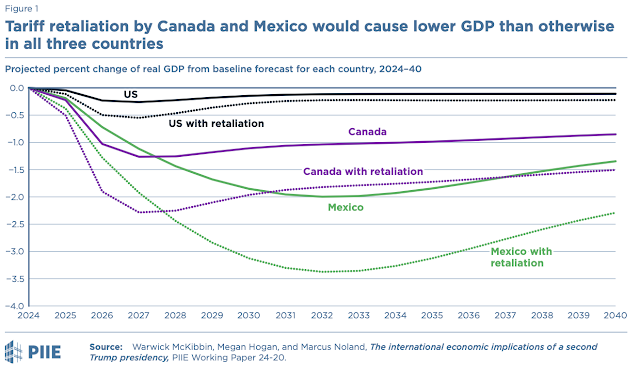The Tariff Man is at it again. Last Saturday, Trump imposed 25 percent tariffs on Canada and Mexico, as well as an additional 10 percent tariff on Chinese imports. The justification Trump used was to address the threat posed by fentanyl, and to use the Emergency Economic Powers Act to do it. So why China, Mexico, and Canada? Because according to Trump, the fentanyl comes from China and passes through Canada and Mexico before it comes to the United States. Granted, he was able to delay the tariffs on Mexico and Canada for a month because he received some concessions about border security as it pertains to fentanyl. Whether they resume in a month remains to be seen. At the same time, here are some reasons why this latest round of tariffs is ridiculous:
- China, Mexico, and Canada will not be paying these taxes. It is not the foreign countries that bear the majority of the tax burden for tariffs, but it will be the American consumers and American businesses. There were a dozen studies showing that tariffs during the first Trump term were almost entirely paid by U.S. consumers and businesses. The fact that U.S. citizens and enterprises will get hit much harder than China, Mexico, or Canada ever will undermines the argument.
- Trump is undermining his trade agreement from his first term. Trump touted the United States-Canada-Mexico Agreement (USMCA) as the fairest and most balanced trade agreement the United States ever signed into law. This bout of tariffs violate his promise with USMCA, which can make him less trustworthy in future engagements with other countries.
- This trade war will increase further trade retaliation. Other countries can and do retaliate in response to tariffs. The Federal Reserve concluded that retaliation helps offset what little benefit that tariffs develop. The Peterson Institute for International Economics found that the GDP of all countries involved will lower as a result of the tariffs and subsequent retaliation.
- Previous tariffs hurt the American people. When Trump implemented the tariffs in his first term, what happened? Trump's tariffs cost the country $51 billion in economic output, a reduction of wages by 0.14 percent, and employment decreased by 166,000 jobs. Bush Jr.'s tariffs cost 200,000 jobs and $4 billion in lost wages. What about the tariffs of Trump's tariff mentor, William McKinley? They resulted in lower productivity and higher consumer prices.
- Trump's tariffs are likely to hurt the American people again. Last week, Trump justified the tariffs by saying that they will make America rich and very strong. Too bad he is wrong on that front. Not only did tariffs not work in the past. The Tax Foundation estimated that these tariffs would shrink economic output by 0.4 percent over the next decade while amounting to a tax of $800 on the average household. The Peterson Institute for International Economics calculated that it will reduce the average household's purchasing power by $1,200 per year. Trump still has not learned that you cannot tax your way to prosperity.
- Trump's argument about tariffs and economic prosperity does not hold. If tariffs are so great, why does Trump simply implement them no matter other nations decide to do? Why did he take them off the table instead of go ahead with the tariffs if they are so great? If tariffs are simply tools to threaten other nations with and then Trump removes them upon compliance, then tariffs were never about economic prosperity.
- Nor does his argument about stopping border crossings. Trump also said that he wanted to implement these tariffs because he wants to "stop the flood of illegal aliens." This is humorous because a tariff is a subpar way of going about it. Why? As the American Enterprise Institute (AEI) brings up, tariffs appreciate the value of the dollar. A dollar with a higher value makes working in the United States more attractive to immigrants, thereby increasing border crossings.
- And fentanyl will get cheaper. More immigration will not be the only result of the appreciated dollar as a result of the dollar. To quote AEI again, the exchange rate appreciation would lower the dollar price of fentanyl because the fentanyl would not be subject to tariffs. Cheaper fentanyl would mean greater consumption, more substance abuse, and more overdoses, which is exactly what Trump purports to be preventing.


No comments:
Post a Comment